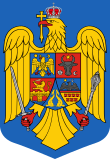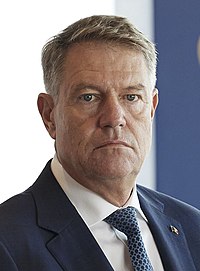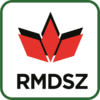
A | B | C | D | E | F | G | H | CH | I | J | K | L | M | N | O | P | Q | R | S | T | U | V | W | X | Y | Z | 0 | 1 | 2 | 3 | 4 | 5 | 6 | 7 | 8 | 9
Politics of Romania Politica României | |
|---|---|
 | |
| Polity type | Unitary semi-presidential republic |
| Constitution | Constitution of Romania (1991) |
| Legislative branch | |
| Name | Parliament |
| Type | Bicameral |
| Meeting place | Palace of the Parliament |
| Upper house | |
| Name | Senate |
| Presiding officer | Nicolae Ciucă, President of the Senate |
| Lower house | |
| Name | Chamber of Deputies |
| Presiding officer | Alfred Simonis (ad interim/acting), President of the Chamber of Deputies |
| Executive branch | |
| Head of State | |
| Title | President |
| Currently | Klaus Iohannis |
| Appointer | Direct popular vote |
| Head of Government | |
| Title | Prime Minister |
| Currently | Marcel Ciolacu |
| Appointer | President |
| Cabinet | |
| Name | Government of Romania |
| Current cabinet | Ciolacu Cabinet |
| Leader | Prime Minister |
| Deputy leader | Deputy Prime Minister |
| Appointer | President |
| Headquarters | Victoria Palace |
| Ministries | 18 |
| Judicial branch | |
| Name | Judiciary of Romania |
| High Court of Cassation and Justice | |
| Chief judge | Corina Corbu |
| Constitutional Court | |
 |
|---|
Romania's political framework is a semi-presidential representative democratic republic where the Prime Minister is the head of government while the President, according to the constitution, has a more symbolic role, is responsible for the foreign policy, signs certain decrees, approves laws promulgated by the parliament, and nominates the head of government (i.e. Prime Minister). Romania has a democratic, multi-party system, with legislative power vested in the government and the two chambers of the Parliament, more specifically the Chamber of Deputies and the Senate. The judiciary is independent of the executive and the legislature. From 1948 until 1989, the communist rule political structure took place in the framework of a one-party socialist republic governed by the Romanian Communist Party (PCR) as its only legal party.
Romania's 1991 constitution (amended in 2003) proclaims it a democratic and social republic, deriving its sovereignty from the people. According to the constitution, "Human dignity, civic rights and freedoms, the unhindered development of human personality, justice, and political pluralism are supreme and guaranteed values."
The constitution provides for a President, a Parliament, a Constitutional Court, and a separate court system which includes the High Court of Cassation and Justice. The right to vote is granted to all citizens over 18 years of age.
The Economist Intelligence Unit rated Romania as a "flawed democracy" in 2023.[1]
Executive branch

| Office | Name | Party | Since |
|---|---|---|---|
| President | Klaus Iohannis | Independent Supported by: National Liberal Party (PNL) Democratic Forum of Germans in Romania (FDGR/DFDR) |
21 December 2014 |
| Prime Minister | Marcel Ciolacu | Social Democratic Party (PSD) | 15 June 2023 |
The president is elected by popular vote for a maximum of two five-year terms (four-year terms until 2004). The president is head of state (charged with safeguarding the constitution, foreign affairs, and the proper functioning of public authority), supreme commander of the armed forces, and chairperson of the Supreme Council of National Defense. According to the constitution, the president acts as a mediator among the state's power centers and between the state and society. The president nominates the prime minister after consultation with the party holding an absolute majority in Parliament or, if there is no such majority, with all the parties in Parliament.
Ambiguity in the Constitution of Romania (Article 85 (1), Article 103 (1))[2] may lead to situations where a coalition of parties obtaining an absolute majority in Parliament, or a party holding a relative majority in Parliament, would be unable to nominate a prime minister because the president would refuse the nomination (with no party holding an absolute majority in Parliament). According to Article 103 (1), "unless no such majority exists", is interpreted by the president as "unless no such party exists" (although an absolute majority may be formed by one party, a coalition of parties, or an alliance).
In the 2008 parliamentary elections,[3] the Alliance PSD+PC won 33.09 percent of the seats in the Chamber of Deputies and 34.16 percent of the seats in the Senate. The PNL won 18.57 percent of the seats in the Chamber of Deputies and 18.74 percent of the seats in the Senate, giving both parties a majority in the Chamber of Deputies and the Senate. However, the president nominated a member of the PDL (which won less than 32.36 percent of the seats in the Chamber of Deputies and 33.54 percent of the seats in the Senate. The nominated prime minister chooses the other members of the government, and the government and its program must be confirmed by a vote of confidence from Parliament.
Legislative branch
| Office | Name | Party | Since |
|---|---|---|---|
| President of the Senate | Nicolae Ciucă | National Liberal Party (PNL) | 13 June 2023 |
| President of the Chamber of Deputies | Alfred Simonis (ad interim/acting) | Social Democratic Party (PSD) | 14 June 2023 |
The national legislature is a bicameral parliament (Romanian: Parlament), consisting of the Chamber of Deputies (Romanian: Camera Deputaților) and the Senate (Romanian: Senat). Members are elected to four-year terms by universal suffrage in a party-list proportional representation electoral system. Beginning in 2008, members are elected by mixed-member proportional representation.
The number of senators and deputies has varied in each legislature, reflecting population changes. In 2008, there were 137 senatorial seats and 334 seats in the Chamber of Deputies; of the 334 deputy seats, 18 were held by ethnic minority representatives which would not meet the five-percent electoral threshold required for other parties and organizations.
Classification of political parties
Romania has a multiparty political system, which makes a majority government virtually impossible (unless a very high score is achieved in the legislative election by one particular political party). Smaller parliamentary parties have sometimes merged with larger ones during previous legislatures before 2020 (or created/were part of several electoral alliances). Currently, there are five main parliamentary parties (excluding the 18 ethnic-minority parties which have one representative each) as follows:
| Logo | Party name | Ideology | Leader(s) | Notes | |
|---|---|---|---|---|---|

|
National Liberal Party (Romanian: Partidul Național Liberal) |
Conservative liberal, centre-right populist, de facto catch all | Nicolae Ciucă | Until November 2021, the largest ruling party through a coalition government previously established in December 2020, but subsequently formed a minority government solely with the UDMR/RMDSZ after early September 2021 until late November of the same year (even after it was dismissed by a recorded-voted no confidence motion). It is currently part of a grand coalition government known as the National Coalition for Romania (CNR for short) along with PSD, being the second largest party within it. Additionally, it has also been crushed by internal disputes, growing corruption scandals, and departures of various MPs and local politicians, some of which had already founded several splinter parties (e.g. most notably Ludovic Orban's Force of the Right or FD for short). | |

|
Social Democratic Party (Romanian: Partidul Social Democrat) |
Social democratic, centre-left populist, de facto catch all | Marcel Ciolacu | Between late 2019 and late 2021 in opposition. During late November 2021, it joined the grand coalition CNR government alongside PNL and UDMR/RMDSZ, forming a large, comfortable, even constitutional majority. Currently, it is the largest ruling party of the aforementioned coalition. | |

|
Save Romania Union (Romanian: Uniunea Salvați România) |
Neoliberalism, progressive-liberal, anti-corruption | Cătălin Drulă | Currently, the third largest parliamentary party (previously established as a formal political and electoral alliance between the USR and PLUS known as the 2020 USR PLUS Alliance and then simply as USR-PLUS/USR PLUS) and in opposition towards the PSD-PNL-UDMR/RMDSZ grand coalition government (as well as to the current PSD-PNL government). Syncretic political position (mostly with considerable focus towards anti-corruption and the rule of law). | |

|
Alliance for the Union of Romanians
(Romanian: Alianța pentru Unirea Românilor) |
Romanian nationalism, Romanian irredentism, Euroscepticism, right-wing populism, national conservatism | George Simion | Currently the smallest opposition party in the parliament. At the previous legislative elections, AUR gained only 9% of the votes in all of Romania and its diaspora, which, however, resulted in a surprise result that ultimately led the party to become the fourth largest one in the country at central political level. Since its accession to the Romanian parliament, it has already lost several deputies and senators. | |

|
Democratic Alliance of Hungarians in Romania (Romanian: Uniunea Democrată Maghiară din România) |
Centre-right, Hungarian minority interests, Hungarian ethnic minority party | Hunor Kelemen | Previously, the smallest ruling party in the centre-right coalition formed in December 2020 (which was later disbanded in September 2021). It was also part of the CNR ruling grand coalition along with PNL and PSD, being still the smallest party (or junior partner) in the aforementioned government. Since June 2023, it switched to opposition after not voting the Ciolacu Cabinet. | |
The main four non-parliamentary parties (the first two around the five-percent threshold) with local representatives are as follows:
| Logo | Party name | Romanian name | Ideology | Leader | |
|---|---|---|---|---|---|
| People's Movement Party | Partidul Mișcarea Populară (PMP) | Centre-right | Eugen Tomac | ||
| PRO Romania | PRO România (PRO) | Social liberalism | Victor Ponta | ||
| Christian Democratic National Peasants' Party | Partidul Național Țărănesc Creștin Democrat (PNȚCD) | Agrarianism Conservatism Christian democracy |
Aurelian Pavelescu | ||

|
Green Party | Partidul Verde (PV) | Green conservatism | Lavinia Cosma Marius Lazar | |
Unlike other former Soviet-bloc countries (such as, most notably, neighbouring Republic of Moldova), no political party claiming to be the successor of the Romanian Communist Party (PCR) has been or is currently a significant player on the political scene, although the main continuator of FSN, more specifically PSD, has many times raised suspicions and accusations from electoral contenders regarding the past political careers of many of its current and former members who were first tier, high-ranking members of the PCR before the 1989 Romanian Revolution. The PNL also has many former Securitate members, former PCR members, or their relatives, in part through the merger with the PDL in 2014 but not only.
Latest elections
Presidential election
The last presidential election was held on 10 and 24 November 2019.
